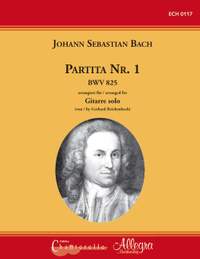Recording of the Week,
Visages Baroques from new Deutsche Grammophon signing Raphaël Feuillâtre
When the Presto team heard that Deutsche Grammophon had signed a guitarist for the first time in many a year (perhaps ever? Readers with long memories, answers on a postcard…), we knew something special was coming. 26-year-old Djibouti-born French guitarist Raphaël Feuillâtre’s big breakthrough came with a pair of prestigious competition victories in 2017 and 2018, though his discovery by Deutsche Grammophon was reportedly down to someone at the label stumbling across his online performances by chance!
 Feuillâtre’s label debut Visages Baroques is, indeed, something very special – a thoughtful programme of Baroque music flying the flag not just for the guitar as an instrument, but for the noble art of transcription. Familiar works by Bach appear in new and fresh guises, alongside less-heard selections from the huge treasure-chest that is the French Baroque.
Feuillâtre’s label debut Visages Baroques is, indeed, something very special – a thoughtful programme of Baroque music flying the flag not just for the guitar as an instrument, but for the noble art of transcription. Familiar works by Bach appear in new and fresh guises, alongside less-heard selections from the huge treasure-chest that is the French Baroque.
Two larger-scale Bach works act as tent-posts; the first, in a delightfully pleasing symmetry, is a transcription both by and of Bach. His BWV972 was itself a reworking for solo keyboard of a concerto by Vivaldi, and here Judicaël Perroy, who Feuillâtre cites as one of his key mentors, gives Bach a taste of his own medicine in arranging it in turn for solo guitar. Inevitably a degree of bold panache is lost in the transition, but the arrangement wisely makes a virtue of this and Feuillâtre really leans into the resulting different approach. The opening is intentionally more pensive than declamatory, though once the music gets underway, the moto perpetuo semiquavers actually have more spring in their step in this incarnation than in many performances of Bach’s harpsichord version. The simple repeated chords of the Larghetto are particularly expressive, and the closing Allegro gives Feuillâtre an opportunity to show off his agility and sonic variety to the full.
Raphaël Feuillâtre plays the Larghetto from Bach's Concerto after Vivaldi for Solo Keyboard BWV972, arr. Judicaël Perroy
While noisy flamboyance may not be the guitar’s forte, it’s more than capable of establishing a sense of weighty gravitas. Nowhere is this more apparent than in the opening Prelude to Bach’s Partita BWV825, arranged by Gerhard Reichenbach (for which the sheet music is available below). Some years ago I was pleasantly surprised by the extent to which Sean Shibe’s performances of Bach lute works on the guitar took the instrument in the direction of a majestic organ voluntary – and evidently that wasn’t a one-off, as Feuillâtre achieves the same here in the Prelude, with the guitar’s resonant lower register in a starring role. Elsewhere in the suite, that same hefty bass sound gives a much-needed energy to the Courante and two Menuets.
Around the two larger Bach works is a generous sprinkling of French suite movements, representing the ancestry of the form Bach had inherited. Of particular note is another transcription-of-a-transcription, this time of Forqueray’s La Bellmont - originally for viola da gamba, transcribed for keyboard by the composer’s son, and now in its third iteration for the guitar. Where the original has an air of wistful sadness about it and the keyboard version a sense of dark foreboding, the guitar arrangement instead captures a pleasing combination of swagger and elegance. These different visions, showing the music from three different angles, highlight a truth about early music that we sometimes don’t like to admit – that arrangements and reimaginings can result in something refreshing and worth hearing, and that the oldest and most ancestral version may not have any real claim to be the “best”.
Raphaël Feuillâtre plays his own arrangement of L'Aimable from Book 1 of Royer's Pièces de clavecin
Although as the solo artist Feuillâtre is of course centre stage, it would be remiss of me not to mention his other contribution to the album – as arranger. I don’t doubt that he is more than capable of producing characterful transcriptions of anything that crosses his path, but here he contents himself with a single calling-card – a gently lilting one-in-a-bar version of Royer’s L’Aimable that plays up the fluid nature of the music, whereas many keyboard performances seem to wallow in Gallic melancholy.
Perceptive readers may have picked up on the fact that for many of these pieces, I think Feuillâtre’s take is actually more enjoyable than the original. I’m sure many will differ – but at the very least I hope you’ll agree that there’s room for both interpretations. For me, this is definitely a case of vive la difference!
Raphaël Feuillâtre (guitar)
Available Formats: CD, MP3, FLAC, Hi-Res FLAC
arr. for guitar by Gerhard Reichenbach
Available Format: Sheet Music




